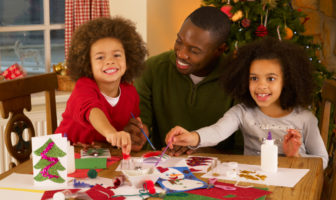The holiday season is a great time of year to teach your child the joys of sharing and gift giving. While children often think of holidays as opportunities to receive gifts, they can also be times to help cultivate their gratefulness and kindness towards others. You can make this even more fun by spending time with your child making personal gifts for their friends, family, and teachers. This helps to reinforce the idea that gift giving is not about spending money on someone, but instead it is about taking time to show someone how much you care about them.

Stress & Humans
Did you know...
Humans aren’t only stressed by negative things, we are also stressed by positive things.
Children sense emotional energy three times as strongly as an adult does.Dr. Bryan Post
Our systems can be strained in either direction. This is why, even after a happy or joyous event, we can often feel tired, agitated, or as I like to say - CRISPY.
For growing people, this stress is magnified. They get easily overwhelmed by new places, new people, new experiences, etc. It’s all normal and necessary. In fact, we need a certain amount of stress in our lives to grow. However, it's important to know that when your growing people are acting in unsavory ways, because they are overdone and out of sorts, they need your help re-regulating their system.
One of my favorite teachers in grad school was Dr. Bryan Post. He provides some enlightening information on those BIG emotions from growing people.
"By nature of their development, children are more sensitive than adults. Children will sense emotional energy three times as strongly as an adult simply because their regulatory systems are in the earliest stages of development and they must rely on their senses for survival. Whereas the adult’s regulatory system has been functioning for so long at such a continued state, that it has become conditioned to its environment, and therefore, somewhat desensitized to outside input. ... We must learn to listen and respond to the child's behaviors, rather than react. This emotional communication is the best reflection for what they truly need."
So when you start to notice your growing people (and yourself) starting to slip out of the human brain, it's a cue that the system is being stressed. One of my favorite ways to help steady the system is through eye to eye, skin to skin and heart to heart contact.
When someone you love gets a bit wobbly, take a moment and really connect.
Give them:
* Eye to eye - Look them in the eyes with kindness and empathy. If possible, get lower than them.
* Skin to skin - Gently touch them in a soothing manner, and be present.
* Heart to heart - Then, if possible, give them a big hug and feel their heart against yours. This communicates a deep level of safety and connection.
(By the way, you can also do this with yourself. When you're feeling stressed, rub your hands together, pat your heart and look at yourself in the mirror, and say, "I know you are feeling wobbly. Be here now. You are safe and loved.")
Beyond that, when there are tears, or a meltdown (them or you), practice your empathy reflex. Before you say anything else, try to calmly say, “I hear you, love. You want XYZ.” Then zip it (no more words) and let them have their feelings.
When we listen and respond to the child's emotions rather than react to their behavior they feel less stressed and they have an easier time getting re-regulated. And when they are re-regulated, the challenging behaviors disappear.
Remember, everyone around you is learning, growing and evolving. Be patient with yourself and be patient with them.
With so much love,
Carrie




